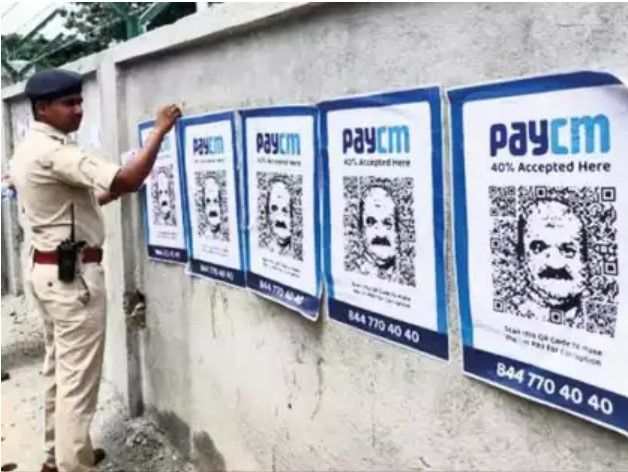Modi remains immensely popular. So, the NDA argues, it will definitely win in 2024. After Karnataka, that certainty has diminished to a probability. Corruption now matters. BJP has lost its halo. In all probability, it will still win the 2024 election. But that is no longer 100% certain.
The sheer scale of the Congress victory in the Karnataka election makes one wonder: will BJP lose in the 2024 general election? BJP’s claim to being a clean party has suffered, and a reputation once lost is not easily regained.
In Karnataka, Congress won 135 seats to BJP’s 66, and 43% of the popular vote to BJP’s 36%. Prime Minister Narendra Modi addressed 19 rallies and six roadshows, in vain. BJP organised more than 100 rallies and roadshows addressed by home minister Amit Shah, party president J P Nadda, and chief ministers Yogi Adityanath, Shivraj Singh Chouhan, Himanta Biswa Sarma and Eknath Shinde, to no avail.
The party boasted of record GDP growth in Karnataka, making it the startup capital of India. It replaced the old guard with new faces, a tactic that had worked in Gujarat. It also sought communal polarisation. Since Rahul Gandhi had called for banning the Bajrang Dal, BJP stalwarts repeatedly raised the war cry ‘Jai Bajrang Bali’. They praised the film The Kerala Story, which portrays Hindu women being converted to radical Islam by the Islamic State (IS). All these ploys failed.
Earlier, BJP had won massively in state elections in Uttar Pradesh and Gujarat, and even in northeastern states with a Christian majority. Modi towered above all politicians like a colossus. Attempts to tar him with allegations of incompetence and corruption failed. But in Karnataka, Modi could not deliver.
BJP retained its popular vote share of 36%. The party maintains that this augurs well for 2024. Congress in Karnataka gained vote share entirely at the expense of the Janata Dal (Secular), or JD(S), not BJP.
Modi is far more popular than his party. Hence, BJP always performs far better in national elections than state elections. In Karnataka, BJP won only 104 of 224 seats in the 2018 state election. Yet, it won 25 of 28 Lok Sabha seats in the 2019 general election. NDA won 353 seats in the 2019 Lok Sabha election. Modi remains immensely popular. So, the NDA argues, it will definitely win in 2024.
After Karnataka, that certainty has diminished to a probability. Corruption now matters. In Karnataka, the BJP government was accused, not just by opposition parties but even by contractors, of running a ‘40% sarkar’ – grabbing 40% of every contract. Modi came to power declaring, ‘Na khaunga, na khane doonga’ (I will neither take bribes nor allow others to take them). That sounds hollow in Karnataka.
BJP says such local corruption allegations do not affect its all-India image. That is too glib. The party seemed relatively ascetic in 2014, but now has the reputation for unprecedented money power. It garners 90% of electoral bonds. It has allegedly bought defectors across Indian states for sums rumoured to be humongous. This has yielded short-term political gains but tarnished its once-clean image.
In the 2019 general election campaign, Rahul Gandhi accused BJP of gifting ₹30,000 crore to Anil Ambani via the Rafale defence deal. This did not carry conviction with voters. The allegation was not backed by solid evidence, and Ambani himself went bust. Far more credible today are the revelations of Hindenburg Research about the Adani Group that is seen to be close to BJP. With a mountain of details, Hindenburg alleged massive share manipulation and fraud. In consequence, foreign investors dumped Adani shares and wiped out $130 billion of the group’s market capitalisation (there has been a partial recovery since).
France’s TotalEnergies put on hold its proposed green hydrogen joint venture with Adani. Global market tracker MSCI slashed its estimate of the free float of Adani Total and Adani Transmission. The Securities and Exchange Board of India (Sebi) is investigating Hindenburg’s allegations. On Monday, it asked the Supreme Court for six months more to investigate the Hindenburg report.
Meanwhile, in Parliament, Rahul Gandhi and Arvind Kejriwal have alleged that Adani is really managing Modi’s money, and that this apparently explains how Adani has soared from humble origins to becoming the third-richest man in the world. (After Hindenburg, he slipped to 12th position, still remarkable.)
Global markets regard Adani as an excellent businessman and have lent him billions to expand his empire. Independent analysts have testified to Adani’s high competence. But questions remain about how his share prices have risen so much, sometimes almost a hundred-fold.
Ordinary folk believe, with good reason, that political contacts matter greatly in India. They cannot understand how somebody can suddenly become so rich through competence alone. In consequence, BJP’s image has been affected not just by the jibe of a ‘40% sarkar’ in Karnataka but accusations of crony capitalism at the all-India level.
BJP’s former Kashmir governor Satyapal Malik said in a recent TV interview that the Hindenburg accusation was really hurting the party. He said even village women were singing songs implying that Adani was a crony capitalist. This, he said, bodes ill for BJP.
His thesis is supported by the Karnataka election outcome. BJP has lost its halo. In all probability, it will still win the 2024 election. But that is no longer 100% certain.
This article was originally published by The Economic Times on May 16, 2023.


